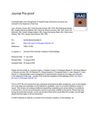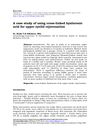 19 citations,
June 2020 in “Animals”
19 citations,
June 2020 in “Animals” Poor maternal nutrition can lead to fewer wool follicles in Chinese Merino sheep.
 19 citations,
October 2017 in “The FASEB Journal”
19 citations,
October 2017 in “The FASEB Journal” Male hormones cause different growth in identical human hair follicles due to their unique epigenetic characteristics.
 17 citations,
May 2015 in “Nanomedicine: Nanotechnology, Biology and Medicine”
17 citations,
May 2015 in “Nanomedicine: Nanotechnology, Biology and Medicine” Scientists created tiny particles loaded with a hair growth drug, minoxidil, that specifically target hair follicles and skin cells to potentially improve hair growth.
 15 citations,
August 2013 in “Stem Cells and Development”
15 citations,
August 2013 in “Stem Cells and Development” The method increases stem-like cells for better skin regeneration.
 15 citations,
July 2017 in “PubMed”
15 citations,
July 2017 in “PubMed” Injecting a mix of human skin and hair cells into mice can grow new hair.
 15 citations,
October 2014 in “Hormone Molecular Biology and Clinical Investigation”
15 citations,
October 2014 in “Hormone Molecular Biology and Clinical Investigation” Some hair loss and prostate drugs might increase the risk of diabetes and heart disease.
 13 citations,
February 2018 in “Plastic and Reconstructive Surgery”
13 citations,
February 2018 in “Plastic and Reconstructive Surgery” The study found that a specific signaling pathway helps skin wounds heal faster but may lead to larger scars.
 12 citations,
April 2018 in “Physiology & Behavior”
12 citations,
April 2018 in “Physiology & Behavior” Finasteride raises suicide-linked aggression and stops clozapine's positive effects in schizophrenia animals.
 10 citations,
January 2016 in “Elsevier eBooks”
10 citations,
January 2016 in “Elsevier eBooks” Nanoparticles can speed up wound healing and deliver drugs effectively but may have potential toxicity risks.
 10 citations,
January 2010 in “Veterinary pathology”
10 citations,
January 2010 in “Veterinary pathology” A new mutation in the hairless gene causes hair loss and skin wrinkling in mice.
 9 citations,
September 2015 in “Medical Clinics of North America”
9 citations,
September 2015 in “Medical Clinics of North America” The document explains how to do skin procedures, care after surgery, and when to use certain treatments.
 7 citations,
June 2021 in “Amino acids”
7 citations,
June 2021 in “Amino acids” Human hair protein modifications could potentially indicate heart disease risk.
 7 citations,
February 2021 in “Dermatologic Therapy”
7 citations,
February 2021 in “Dermatologic Therapy” Sebaceous glands are involved in various skin disorders, some treatable with medications like finasteride and minoxidil.
 7 citations,
September 2020 in “Journal of The American Academy of Dermatology”
7 citations,
September 2020 in “Journal of The American Academy of Dermatology” Low-dose oral minoxidil for hair loss can cause mild excessive hair growth, usually appearing within the first 3 months, but it can be managed by adjusting the dose or removing the unwanted hair, with most people not needing to stop the treatment.
 6 citations,
April 2019 in “Endocrinology and Metabolism Clinics of North America”
6 citations,
April 2019 in “Endocrinology and Metabolism Clinics of North America” Testosterone therapy for transmasculine individuals is generally safe with medical supervision, improves mental health, and has mixed effects on physical health.
 6 citations,
November 2010 in “International Journal of Andrology”
6 citations,
November 2010 in “International Journal of Andrology” New oral testosterone formulations show potential for safer, effective hormone replacement in men with low testosterone.
 6 citations,
August 2007 in “Journal of Surgical Research”
6 citations,
August 2007 in “Journal of Surgical Research” Mice genetically modified to produce more Del1 protein had faster hair regrowth.
 6 citations,
November 2018 in “Antimicrobial agents and chemotherapy (Print)”
6 citations,
November 2018 in “Antimicrobial agents and chemotherapy (Print)” Fluconazole can cause hair loss, but the exact cause is unknown.
 6 citations,
October 2013 in “Expert Review of Dermatology”
6 citations,
October 2013 in “Expert Review of Dermatology” Psychotropic medications can cause skin problems, including serious conditions, and patients should be monitored closely.
 6 citations,
August 1993 in “Archives of Dermatology”
6 citations,
August 1993 in “Archives of Dermatology” A woman's hair changed to a dry, tangled texture that's hard to comb after treatment with spironolactone, suggesting the medication might cause such hair changes.
 1 citations,
October 2023 in “bioRxiv (Cold Spring Harbor Laboratory)”
1 citations,
October 2023 in “bioRxiv (Cold Spring Harbor Laboratory)” Printing human stem cells and a special matrix during surgery can help grow new skin and hair-like structures in rats.
 August 2023 in “International journal of basic and clinical pharmacology”
August 2023 in “International journal of basic and clinical pharmacology” Herbal hair serum promotes natural hair growth and maintains healthy hair.
 April 2022 in “International Journal of Health Sciences (IJHS) (En línea)”
April 2022 in “International Journal of Health Sciences (IJHS) (En línea)” Cross-linked hyaluronic acid injections effectively rejuvenated upper eyelids, giving a youthful look for over a year.
 April 2019 in “Journal of Investigative Dermatology”
April 2019 in “Journal of Investigative Dermatology” Many patients with autoimmune blistering skin disorders change their diets, avoiding foods like alcohol, citrus, and spices, and some find vegetables and dairy helpful.
 February 2019 in “bioRxiv (Cold Spring Harbor Laboratory)”
February 2019 in “bioRxiv (Cold Spring Harbor Laboratory)” The gene Prss53 affects hair shape and bone development in rabbits.
 April 2014 in “Jurnal Biomedik : JBM”
April 2014 in “Jurnal Biomedik : JBM” An 8-year-old girl had nail and hair issues that improved without specific treatment, but fungal nail infection was hard to cure.
 September 2020 in “Journal of Cutaneous Pathology”
September 2020 in “Journal of Cutaneous Pathology” A patient with a skin condition had unusual scarring hair loss but improved with treatment.
 July 2019 in “Mayo Clinic proceedings”
July 2019 in “Mayo Clinic proceedings” The man's fatigue and erectile dysfunction were improved by treating his obesity-related low testosterone without needing testosterone replacement.
 January 2000 in “BioScience”
January 2000 in “BioScience” The document concludes that understanding hair biology is key to treating hair disorders, with gene therapy showing potential as a future treatment.
 73 citations,
April 1999 in “Dermatologic Clinics”
73 citations,
April 1999 in “Dermatologic Clinics” Lasers and light sources can effectively remove hair, work best on fair skin with dark hair, and usually need multiple treatments.






























